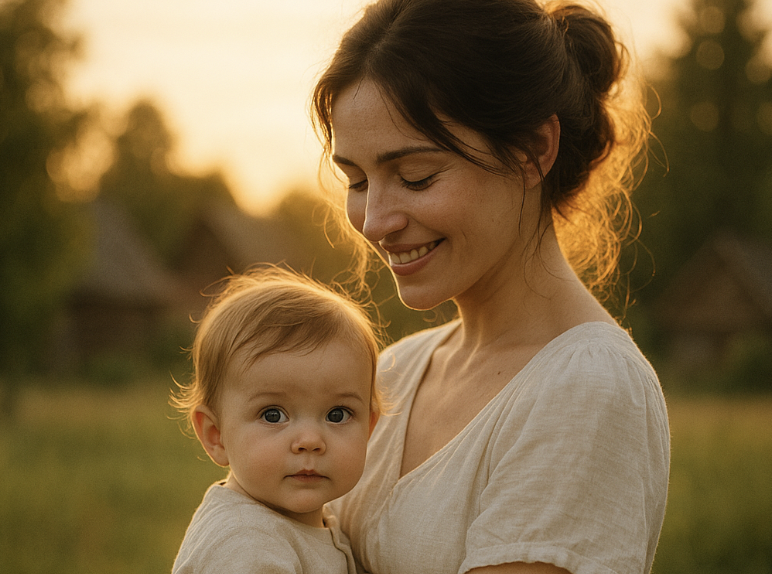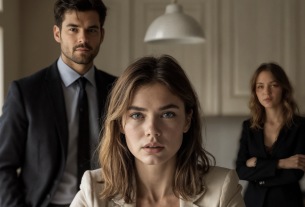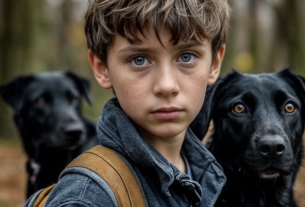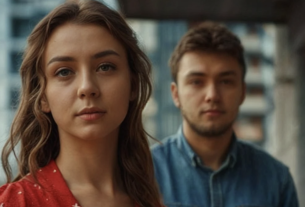The gate’s creak sliced through the frosty air. Not the usual kind—the one when her husband comes back from the apiary—but a different one: hurried and guilty.
Anna set aside her knitting and looked out the window. No one. Only snow, lazily swirling in the lamplight.
“Vanya, can you check?” she called deeper into the house. “Something creaked.”
Ivan stepped onto the porch and immediately returned, carrying something bulky wrapped in an old blanket.
And behind him, clinging to his pant leg, hobbled another—exactly the same.
“Anya… it’s… this…”
Two little boys, two years old at most. Cheeks red from the cold, button eyes staring with identical fright. They smelled of snow and someone else’s home.
Anna silently took one into her arms. Light as a feather.
“A note,” Ivan said, handing her a crumpled sheet.
Crooked handwriting, blurred by melting snow: “Save them. I beg you. I can’t.” That was all. No name, no explanation.
“We have to call the police,” Ivan said firmly, though his voice trembled. “They’ll find the cuckoo-mother.”
“And if they don’t?” Anna asked softly, pressing the child to her. “Then what? An orphanage? Vanya, just imagine…”
She looked at her husband. In his eyes there was confusion and fear—but something else, too.
Something she knew and loved in him—his huge heart, incapable of meanness.
“They’re frozen through.”
She undressed them by the stove and gave them warm milk. The boys gulped greedily, their frightened eyes never leaving her. They were like two sparrows blown from a nest in a blizzard.
That night Anna didn’t sleep. She sat by the little bed they had hastily put together from crates and watched two identical, softly snuffling noses.
Thoughts darted through her head. What will people say?
How would they explain this? God hadn’t given them children of their own, and now suddenly there were two. Strangers. Completely strangers. Yet for some reason her heart already ached for them as if they were her own.
She felt something changing inside her. As if a room that had stood empty for years suddenly filled with light and meaning.
Toward dawn, Ivan came in. He stood beside her without a word and laid his broad palm on her shoulder.
“No one came for them,” she whispered.
“I know,” he answered just as quietly.
He looked at the boys, then at her. And in his gaze she saw not doubt, but a decision—the kind a man makes once and for all.
“Then they’ll be ours,” he said simply, as if talking about the weather. “We’ll manage. Anya, we won’t give them up.”
Anna closed her eyes, holding back tears. Not of grief—no. Of a great happiness that flooded her to the brim.
That’s how Dima and Alyosha came into their home. And no one knew then that that frosty night was only the beginning of a long and wondrous story.
Four years passed. The village buzzed for a long time like a disturbed hive. Anna felt curious eyes burning into her back, and behind every neighbor’s word lurked the mute question: “Whose are they?”
“Are they at least healthy?” old Klava drawled at the general store, scrutinizing the boys pressed against Anna’s legs. “You never know what kind of blood… genes.”
“Healthier than the healthiest,” Anna snapped, feeling a dull irritation boil up inside. “Our blood, the Stepanovs’. We adopted them. All the papers are in order.”
She made a point of emphasizing it. “Ours.” “Stepanovs.” So no one would have any doubts. But the doubts remained.
Dima and Alyosha grew up quiet, in their own heads. They were like two communicating vessels—understanding each other without words, striking bargains with a glance. If one was punished, the other would silently sit beside him and refuse dinner, too.
Ivan at first didn’t know how to approach them. A man’s tenderness—it’s different from a mother’s. Awkward.
He tried making them wooden swords, but the boys preferred digging in the dirt, studying ant trails.
“They’re not of this world, Anya,” he sighed in the evenings. “A bit feral.”
“They’ll get used to it,” she would answer, though her own heart clenched.
The turning point came in summer, when Ivan first took them to the apiary. He’d feared the bees would scare the boys, but it turned out the opposite.
Dima, the bolder of the two, froze by a hive, listening to the thick, living hum. And Alyosha, usually cautious, suddenly reached his tiny hand toward the comb in the frame Ivan was holding.
“Papa, do they not sting?” Alyosha asked for the first time in a long while, looking straight into Ivan’s eyes.
And that simple word—“Papa”—rang louder to Ivan than any swarm of bees. He realized he’d found the key to their small hearts.
From then on, the apiary became their secret world. Ivan told them about the queen, about the drones, about how a bee finds her way home from miles away. The boys listened, mouths agape.
They turned out to be incredibly observant. They noticed things Ivan had walked past for years.
“That bee is dancing,” Dima once said, pointing at a little bee circling by the entrance. “She’s telling the others where the honey is.”
Ivan froze. He’d read about it in an old book, but had never seen it so plainly. And the boy had.
When the boys turned seven and started school, the whispering behind their backs grew louder.
One day they came home early, both dusty, Dima’s sleeve torn. A high-schooler had called them “foundlings.”
Without thinking, Dima lunged at the bully, and Alyosha, though afraid, stood beside his brother.
That evening Ivan spoke to them man-to-man for the first time, without babying. He didn’t scold them for fighting.
He said, “You did right to stand up for one another. You’re brothers. And you don’t take offense at fools.”
But the village wouldn’t quiet down. When Alyosha fell seriously ill and Anna, crazed with fear, ran about with wet cloths, the feldsher who came offhandedly remarked:
“What do you expect, Anna. They’re taken in. Who knows what runs in their family.”
In that moment Anna felt, for the first time in her life, not hurt but a cold, clear anger. She silently took money from the table and handed it to the feldsher.
“For the visit. Now leave. And don’t come into my house again.”
She nursed Alyosha back herself. She sat by his bed at night, giving him herbal infusions Ivan had gathered.
And when the boy finally opened his eyes and weakly asked for honey, she understood—they had won. Not over the illness. Over something greater.
They had become a family. A real one, hard-won, bound not only by an adoption certificate but by a shared struggle. The four of them against the world. And that world no longer frightened them.
The boys turned fifteen. They shot up, grew strong, their voices began to crack.
The old timidity was gone. Now they were two tall lads, identical as two drops of water but utterly different in character.
Dima—sharp, hot-tempered, with perpetual scrapes on his knuckles. Alyosha—calm, thoughtful, able to watch a single hive for hours. But for each other they still stood like a wall.
The apiary became their true work.
They knew everything about honey. They could tell linden from buckwheat by taste, and predict the weather from the bees’ behavior. Ivan watched his sons with pride and knew—his successors were growing.
It seemed the village had finally gotten used to them and settled down. But the poison once loosed doesn’t disappear. It just lies in wait for its hour.
That hour came at the fair in the district center.
The Stepanovs displayed their honey in pretty jars, with neat labels Alyosha had drawn. Business was brisk.
Anna and Ivan couldn’t get enough of looking at their boys: serious, businesslike, they pitched the goods to customers with flair.
And then Lida, the clerk from their general store, strutted up to their stall with some city dandy.
Her husband had left her for a younger woman, life wasn’t going well, and other people’s happiness cut her eyes like broken glass.
“Oh, the Stepanovs are selling!” she drawled loudly for the whole fair to hear. “And these must be your helpers? Hardworking lads. Not like some people…”
She cast a meaningful look at Dima and Alyosha. Anna tensed. She knew Lida’s sticky, envious way of saying nasty things with a smile.
“Sons, Lidia,” Ivan corrected calmly. “Not helpers.”
“Oh come on, Vanya,” she wouldn’t let up. “Everybody knows everything. Found a couple of castoffs under a fence, and now you puff yourselves up like you birthed them.”
The air around the stall seemed to thicken. People fell silent, turning with curiosity.
Dima, who had been smiling as he filled a jar, froze. His face turned to stone.
“What did you say?” he asked quietly, in a way that chilled Anna to the core.
“What I said,” Lida smirked, basking in the attention. “That your real mama threw you out like pups. She didn’t want you.”
That was the last straw. Dima set the jar down on the counter.
One sharp motion—and the tray of comb honey flew to the ground, splashing Lida and her escort with sticky drops.
A brawl erupted. Alyosha rushed to pull them apart, but the city slicker struck him from the side.
The brothers fought in silence, fiercely, the two of them against everyone trying to break it up.
When they were finally separated, Dima’s lip was split, and a bruise was blooming under Alyosha’s eye.
But the worst were their eyes. In them stood the same mute question, turned to Anna and Ivan.
Lida screeched, demanding the police and compensation.
Then Anna stepped forward. She didn’t shout. She spoke softly, but her voice carried over the hushed square.
“Yes, Lidia, you’re right. We found them.
Frozen, hungry, unwanted by anyone. We found them and warmed them. And if it’s a crime to love children another woman abandoned, then my husband and I are criminals.”
She swept her gaze over the crowd.
“And we’re proud of it. Because we raised real men. And you, Lida—what have you raised in your life, besides malice and envy?”
She turned to her sons and took them by the hands.
“Let’s go home, boys.”
They drove home in silence. The tension you could cut with a knife. Back at the house, as Anna treated Dima’s split lip, he looked up at her.
“Mom, is it true?”
Ivan, standing at the window, sighed heavily. Anna understood—the time had come. There was no backing away.
She sat down across from her sons. Ivan stood behind her, his hands on her shoulders. She took a yellowed, crumpled sheet from an old box—the very one.
“It’s true,” she said, and her voice didn’t waver. “We don’t know who your mother is. We only know what was in this note.”
Alyosha took the paper with trembling fingers. Dima stared at one spot, fists clenched.
“She asked to save you,” Anna went on. “She didn’t throw you away, sons. She saved you. Those are different things.”
“Why didn’t you tell us before?” Dima asked dully.
“What would it have changed?” Ivan interjected. “Would we have loved you less? Or you us?
We waited for you to grow. So you could understand it yourselves. So that other people’s malice wouldn’t break you while you were small.”
Alyosha raised his eyes, tears standing in them.
“So we’re… not your own.”
“Kinship isn’t in the blood, Alyosha. It’s right here.” Anna laid her hand over her heart. “You are my son. And you, Dima, are my son. And nothing in the world will change that.”
They talked for a long time that evening—for the first time in fifteen years. The hurt and anger in the boys’ eyes slowly gave way to understanding.
They didn’t get answers to every question, but they got the main one—they were loved. And that mattered most.
Another three years passed. Life found its rhythm.
The brothers finished school and prepared to enter the agricultural institute in the city—they’d decided to grow the apiary, to turn their father’s hobby into a big enterprise.
On the day they turned eighteen, the postman brought a strange parcel.
A heavy, leather-covered suitcase addressed to Dmitry and Alexey Stepanov.
They opened it together. Inside, neatly bundled, lay money. A lot of money. More than they had seen in their entire lives put together. And on top—a sealed envelope.
Alyosha opened it. Inside were several pages, written in a familiar crooked hand.
“My dear, beloved boys,” Anna read aloud, her voice breaking. “If you are reading this letter, it means I am already gone.
And it means my lawyer managed to find you. Forgive me. Not for leaving you. For not being able to come back.”
Their biological mother then told her story.
Of a great love, of the sudden death of their father, of the terrible diagnosis doctors gave her right after their birth.
She knew she was dying. She had no relatives she could entrust them to. And she made the most terrible choice of her life.
“I brought you to the farthest village I’d heard of, where they say kind people live. I watched your house for several days. I saw how your father cared for his wife, how they looked at each other.
And I understood—only them. I left a note and went away so I wouldn’t change my mind.
I gave my lawyer the name of the region and a general description of you, ordering him to start searching adoption archives as soon as you turned eighteen.
It was the only thing I could do.”
She wrote that all these years she had worked, knowing she had little time left. She saved every kopeck. This money was all she could leave them. Their inheritance.
“I know you have real parents. And I am endlessly grateful to them. I gave you life, but they gave you a future. Be happy, my dear ones. Your mother.”
When Anna finished reading, everyone was silent. Dima went to the window and looked for a long time at the apiary, at the hives steeped in the evening sun.
Alyosha took Anna’s hand.
“Mom,” he said quietly. “We’ve only ever had one mom. You.”
Ivan went to Dima and put an arm around his shoulders.
“Well then, son. Now you’ve got enough for a tractor and a new workshop. Dreams do come true.”
Dima turned. The childish hurt was gone from his eyes. There was the calm of a man who had accepted his past.
“Dad,” he said. “Let’s go to the cemetery tomorrow. We’ll bring her flowers.”
Anna looked at her men—her husband, her two tall, handsome sons—and understood that the suitcase of money changed nothing.
It simply put a period at the end of one story and opened a new page in another. Their shared story, which began on that far-off frosty night with the creak of a gate.
Epilogue
Ten years have passed.
On the hill where Ivan’s modest apiary once stood now sprawled the entire honey enterprise, “Stepanov’s Apiary.”
A large log house, a humming bottling workshop, neat rows of new hives, and even a small shop for tourists.
Dima, matured, with gray at his temples, greeted another carload of customers.
He had become an excellent businessman; his booming laugh and confidence won anyone over.
Alyosha, still quiet and thoughtful, had become the apiary’s heart. He developed a new variety of honey now ordered even from the capital.
Anna and Ivan sat on the porch of the new house their sons had built for them next door.
They had grown older, but their eyes shone with peaceful happiness. Ivan could no longer haul heavy frames himself, but every day he came to the apiary—just to sit, to listen to the familiar hum, to give advice.
“Look, Anya,” he nodded toward the apiary, where their sons and now-grown grandchildren bustled about, “who would’ve thought, eh?”
Anna smiled, straightening his collar. She often remembered that woman—their first mother.
They had found her grave in the neighboring district and tended it. Anna never felt jealousy—only quiet womanly solidarity and gratitude. That woman had given her the meaning of her life.
The money sent in the suitcase had been a good start. But the main capital was something else—the work ethic Ivan taught them and the boundless love Anna wrapped them in.
In the evening the whole big family gathered at the table on the veranda. Alyosha brought a kettle of willow-herb tea, Dima sliced comb honey.
His twin daughters, the spitting image of their father, argued over who would get the biggest piece.
Anna watched all the bustle, the happy faces of her children and grandchildren, and pondered what fate is. It isn’t what’s predestined.
Fate is the choice you make every day. The choice to love, to care, to forgive, and to build your happiness in defiance of everything.
Their happiness began with a simple choice made on a cold winter night: the choice not to slam the door on someone else’s misfortune.



